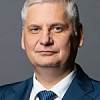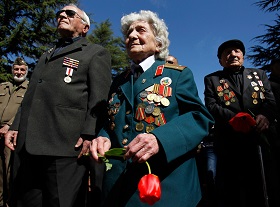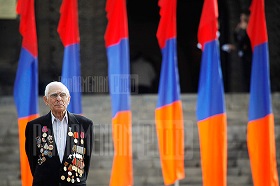The post-Soviet South Caucasus countries have not yet accumulated sufficient experience in conducting their own “festive and commemorative” policies. Before they became independent countries as a result of the collapse of the Soviet Union, Azerbaijan, Armenia and Georgia shared symbols and festive dates with all the other republics (the majority of these dates were associated with the establishment of the Soviet power there).
The post-Soviet South Caucasus countries have not yet accumulated sufficient experience in conducting their own “festive and commemorative” policies. Before they became independent countries as a result of the collapse of the Soviet Union, Azerbaijan, Armenia and Georgia shared symbols and festive dates with all the other republics (the majority of these dates were associated with the establishment of the Soviet power there). The experience of national statehood after the disintegration of the Russian Empire was quite brief (the Azerbaijan Democratic Republic lasted for 23 months, the First Republic of Armenia remained independent for 30 months and Democratic Republic of Georgia a little over three years).
The “festive and commemorative” policies of the three South Caucasian nations are built around five fundamental principles:
— Identification of a national project (either through the restoration of the political and legal succession to the “first republics,” or through the initiation of a new project);
— The Soviet and Russian imperial legacy;
— The first national statehood;
— Ethnic and political conflicts;
— Foreign political identification.
These policies cannot be reduced to a common denominator in the three South Caucasian countries, let alone in the breakaway republics. This is because each specific case has both common and unique features. Each nation has a different symbolic formalization of its attitude to the past and current policies. Georgia has broken away from the Russian and Soviet past more than Azerbaijan and Armenia, which have taken a more selective attitude towards these issues. However, examples of paradoxically close commemorative and festive priorities can be found even in the conflicting countries. The Day of Victory (or Victory Day) in the Great Patriotic War (the name given to World War II in Russia and other former Soviet countries, dating from the Soviet Union’s entrance into the conflict in 1941) is probably the most vivid example of shared commemorative practices.
In Georgia, May 9 is a national holiday, a day off for all in celebration of the Day of Victory over Nazism. This tradition remained even during Mikheil Saakashvili’s administration (when tensions between Tbilisi and Moscow reached their peak), despite the fact that it was marked by a “war on monuments”. In December 2009, the Glory Memorial was demolished in Kutaisi, Georgia’s second-largest city, and in February, a monument was dismantled in Batumi.i
However, as soon as the United National Movement and its leader lost power, this nonselective fight against symbols of the past stopped. Regular ceremonies are held near the Tomb of the Unknown Soldier at Vake Park in Tbilisi, attended by veterans of the Great Patriotic War – there are 1,814 “veterans of the Second World War”, as they are officially known, in Georgia as of February 2015. In 2014, they received a one-time financial assistance package of about 400 lari (about $200) each. The same amount was paid out to 637 persons who lost the heads of their families in 1941–1945. Veterans also enjoy fully subsidized medical insurance (which covers the cost of medication). Nevertheless, there is still heated debate in Georgian academic and political circles about the best date to celebrate Victory Day (May 8, along with the rest of Europe, or May 9, along with Russia).
In Azerbaijan, Victory Day also remains a national holiday. However, back in Soviet times, it was founded upon the idea of the “common feat” of the Soviet people, whereas today Azerbaijani officials and historians focus on the special contribution that their nation made to the Soviet Union’s victory. In this context, the initiative to grant Baku the status of a hero-city that was voiced by Azerbaijani Ambassador to Russia Polad Bülbüloğlu and First Deputy Speaker of the National Assembly of Azerbaijan Ziyafet Asgarov ahead of the celebration of the 70th anniversary of victory in the Second World War is quite telling. According to Asgarov, “victory in the Great Patriotic War was achieved in large part to the efforts of Azerbaijani oil workers and Baku oil. The world should learn about and recognize this historical fact” (link in Russian). In April 2015, pursuant to an order by President of Azerbaijan Ilkham Aliyev, veterans of the Great Patriotic War (a total of 1,341 people) were granted a lump-sum payment of 800 manat (approximately $760), while those who served on the home front and Azerbaijaini nationals who were living in Leningrad during the blockade (roughly 17,000 people) were paid 400 manat (around $380) each. The total amount is considered to be one of the highest allowances paid to veterans in the former Soviet Union.
Victory Day is also one of the most cherished national holidays in post-Soviet Armenia. However, the date (May 9) is celebrated as a double holiday: firstly to honour veterans in the Great Patriotic War and, secondly, to commemorate capture of Shusha in 1992 (formerly an Azerbaijani stronghold in Nagorno-Karabakh, which, once is came under Armenian control, allowed a land link to Armenia via the Lachin corridor to be established). However, even without the contemporary ethnic and political conflict undertones, the significance of the victory in the Great Patriotic War remains great.
Many streets and squares, as well as military units in Armenia and unrecognized Nagorno-Karabakh, have been named after eminent Soviet commanders of the Armenian origin: Ivan Bagramyan, Hamazasp, Ivan Isakov and Sergei Khudyakov (Armenak Khanferiants). As of today, there are approximately 1,000 veterans of the Great Patriotic War in Armenia. A special commission was established in the context of the jubilee celebrations. Although there will be no military parade in Yerevan, official representatives of the country will take part in celebrations in Moscow, and commemorative events will take place in the capital city and other cities around Armenia. Unfortunately, the situation with the social security of veterans remains unsatisfactory, with pensions amounting to 40,000–50,000 drams ($84–100), and discounts on utility fees amount to mere 7,000 drams (less than $15). This is attributed to the difficult social, political and economic situation in the country, rather than a disregard for veterans. Two of Armenia’s four borders (Turkey and Azerbaijan) are closed, and contacts with the world via the remaining two (Russia and Iran) are complicated by the tense relations between Russia and Georgia, and between Iran and the West.
Therefore, despite serious contradictions, conflicts and differences in approaches to the past in the South Caucasus, the history of the Great Patriotic War and the memory of those who took part in it are still respected at the state and public levels. Assessments of the events of 1941–1945 may change, and the local narrative becomes a priority for newly independent nations, whereas events that emphasize the Soviet unity are pushed aside. Professional historians tend to write about nationalists that chose to collaborate with the Nazis back in the 1940s, without incriminating pathos and preaching. However, those reassessments have not caused reinterpretations of history or a denial of the significance of the Soviet Victory. Victory Day remains one of the few unifying dates for the South Caucasian countries [1].
1. The explosion in Kutaisi killed local resident Eka Tsutskhvashvili-Jincharadze and her young daughter Nino.






